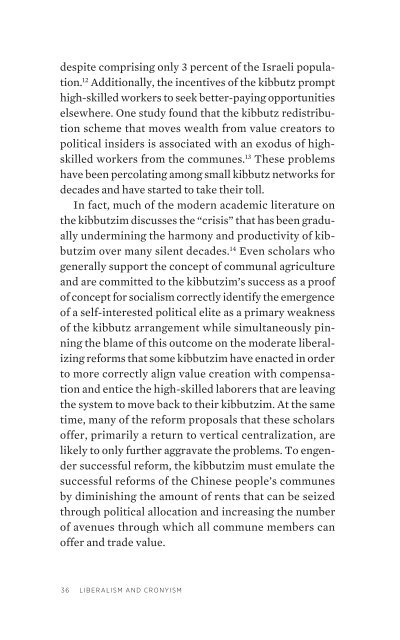url?sa=t&source=web&cd=1&ved=0CCYQFjAA&url=http://mercatus.org/sites/default/files/Holcombe_Cronyism_web
url?sa=t&source=web&cd=1&ved=0CCYQFjAA&url=http://mercatus.org/sites/default/files/Holcombe_Cronyism_web
url?sa=t&source=web&cd=1&ved=0CCYQFjAA&url=http://mercatus.org/sites/default/files/Holcombe_Cronyism_web
Create successful ePaper yourself
Turn your PDF publications into a flip-book with our unique Google optimized e-Paper software.
despite comprising only 3 percent of the Israeli population.<br />
12 Additionally, the incentives of the kibbutz prompt<br />
high-skilled workers to seek better-paying opportunities<br />
elsewhere. One study found that the kibbutz redistribution<br />
scheme that moves wealth from value creators to<br />
political insiders is associated with an exodus of highskilled<br />
workers from the communes. 13 These problems<br />
have been percolating among small kibbutz networks for<br />
decades and have started to take their toll.<br />
In fact, much of the modern academic literature on<br />
the kibbutzim discusses the “crisis” that has been gradually<br />
undermining the harmony and productivity of kibbutzim<br />
over many silent decades. 14 Even scholars who<br />
generally support the concept of communal agriculture<br />
and are committed to the kibbutzim’s success as a proof<br />
of concept for socialism correctly identify the emergence<br />
of a self-interested political elite as a primary weakness<br />
of the kibbutz arrangement while simultaneously pinning<br />
the blame of this outcome on the moderate liberalizing<br />
reforms that some kibbutzim have enacted in order<br />
to more correctly align value creation with compensation<br />
and entice the high-skilled laborers that are leaving<br />
the system to move back to their kibbutzim. At the same<br />
time, many of the reform proposals that these scholars<br />
offer, primarily a return to vertical centralization, are<br />
likely to only further aggravate the problems. To engender<br />
successful reform, the kibbutzim must emulate the<br />
successful reforms of the Chinese people’s communes<br />
by diminishing the amount of rents that can be seized<br />
through political allocation and increasing the number<br />
of avenues through which all commune members can<br />
offer and trade value.<br />
36 LIBERALISM AND CRONYISM


